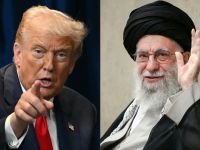After the third night of intense clashes between police and protestors across Turkey, Prime Minister Recep Tayyip Erdogan and his government face growing political pressure on Monday.
Protesters on Sunday branded Erdogan a “dictator” and called for his resignation.
“Dictator, resign!... We will resist until we win,” yelled the crowds, in the latest of a string of protests that have by some accounts left hundreds injured.
The prime minister on Sunday rejected the claims that he is a “dictator,” dismissing protesters as an extremist fringe.
“If you love this country, if you love Istanbul, do not fall for these games,” he said in televised comments.
“They call me a dictator,” Erdogan said in a speech on Sunday. “If they liken a humble servant to a dictator, then I am at a loss for words.”
With Turkish media otherwise giving scant reports about the protests, many turned to social media outlets for information on the unrest.
“There is now a menace which is called Twitter,” Erdogan said. “The best examples of lies can be found there. To me, social media is the worst menace to society.”
Under Erdogan’s leadership, Turkey has boosted economic growth and raised its international profile. But he has been a divisive figure at home, with his government recently passing legislation curbing the sale of alcohol and taking a strong stand against the Syrian regime that some believe has put security at risk.
Police fired tear gas and water cannon Sunday at protesters who marched on Erdogan’s offices in Istanbul and Ankara.
On Saturday, police had withdrawn from Istanbul’s main Taksim Square, the symbolic heart of demonstrations that started over an unpopular building project nearby and boiled over into a general protest against the government.
Crowds of whistling, flag-waving protestors continued to cover Taksim Square but the flashpoint shifted late Sunday to the area near Erdogan’s nearby Istanbul base.
AFP reporters there saw police disperse thousands of demonstrators and incidents continued into early Monday.
Interior Minister Muammer Guler said earlier that more than 1,700 people had been arrested in the unrest nationwide, though most have since been released.
He said 58 civilians and 115 security officers had been injured over several days of protests, although rights groups have put the number of injured higher.
A doctors’ union in Ankara said more than 400 civilians had been injured there including some with serious head wounds.
Rights groups have denounced the violence that police meted out to demonstrators and Turkey’s Western allies have appealed for restraint.
The unrest began as a local outcry against plans to redevelop Gezi Park, a rare green spot near Taksim, but after a heavy-handed police response the protests spread to other districts -- and then to dozens of cities across Turkey.








